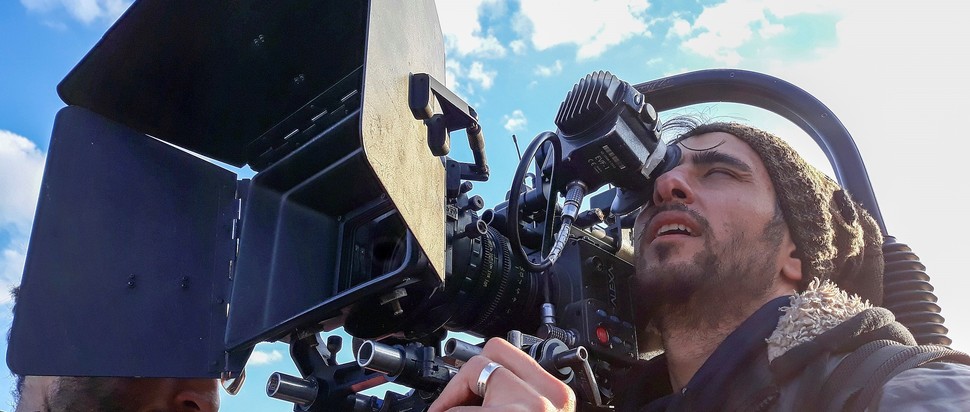Javad Daraei on his screenings at Refugee Festival Scotland
Scotland-based director Javad Daraei welcomes us into his home to discuss Iranian cinema, the refugee experience and acts of defiance
I meet Javad Daraei mere days after the UK government – under the leadership of a supposedly left party – announces new plans for limiting immigration, including raising skill and language requirements and doubling the timeframe for acquiring settled status. Nations depend on rules, Keir Starmer explains in the new white paper; without them, we risk turning into ‘an island of strangers.’
I am not sure who the ‘we’ refers to here – surely not me, nor my family, nor anyone I know – but I think about this, what it means to be a stranger in a country, on my way to Daraei’s home. We’re meeting to talk about his films that are screening at Refugee Festival Scotland and he’s been messaging me to check my dietary requirements; he and his partner have made lunch, a tender act I hadn’t expected but should have, because no one loves offering food to guests more than Iranians. “Please don’t stress too much about feeding me!" I write, a lifetime of being raised in the UK seeping out. “Haha x” comes the reply.
Daraei doesn’t feel like a stranger when I meet him: perhaps he reminds me of my brother a little, or my father, who also left Iran one day and never returned. He swings himself around his flat on crutches, days after a knee surgery to heal injuries sustained at the hands of the Iranian state, and he is unfailingly sweet and friendly, if a little low following his procedure. He and his partner hand me an impossibly large plate of rice, and then he sits opposite me, smiling politely. An ice pack sits on his knee.
Daraei came to the UK almost four years ago, following a fellowship at the University of Edinburgh’s Institute for Advanced Studies in the Humanities. The films he had made until that point in Iran were unflinchingly political, depicting the reality of everyday life for people oppressed and neglected by the regime. His first short I Don’t Like Here follows a trans man struggling for acceptance from his family; a subsequent short Limit takes on a horror-style tone as it explores disability rights; his 2021 feature Metamorphosis in the Slaughterhouse tackles the violent mistreatment of women. It doesn’t take much in Iran to be a dissident filmmaker: all films require sign-off from the Ministry of Culture and Islamic Guidance, multiple permits, and have to pass stringent censorship checks. Needless to say, Daraei’s films did not even attempt to follow the rules.
I’m curious how this alters Daraei’s sense of identity, and what it means to be part of a national cinema more broadly. Does he consider himself an Iranian filmmaker? “In Iran you have two cinemas,” he explains to me, “one is independent, underground cinema, and the other is supported by the government. We can’t say one is better [in terms of] technique and knowledge. But the personalities are so different. As a filmmaker, I respect the technique of these filmmakers, but as a person I cannot, because they are a tool of the government.”
In this way, Daraei’s move away from Iran and screening within festivals such as Refugee Festival Scotland makes sense: he sees himself predominantly as “an international filmmaker,” he explains. “When you say refugee, it shows a big family around the world,” Daraei tells me. “Before I felt I had to be a representative of the Iranian people. But now my family… the population is so much bigger.” In the same way that the idea of a singular Iranian cinema has begun to fracture as underground and diasporic cinema takes a stronger hold, the ability of borders to demarcate self-identity begins to collapse when it becomes impossible to feel belonging within the country that is supposedly yours.
Daraei is excited to have his films screened at the festival; while they’ve been screened in previous festivals abroad, they never showed in Iran. He is currently working on a new film (having done some shooting in his flat in Glasgow) that will be his first English-language film, and is also working on a play and novel. His work continues to be political – an act of defiance against the Islamic regime, even when it is so far away – although he is less certain about the ability of art to affect political change.
“I think people are stronger than artists,” he explains, speaking particularly of the Woman Life Freedom movement in 2022, and the mass dissidence of the Iranian people. “I saw a lot of artists easily changed [by the government], but the people – no. The people fight and they won’t be changed.” Does this change how he feels about filmmaking? “I don’t want to say that a filmmaker can change everything,” he says. “But for me, it’s enough to record the life I’m living and the world around me. Whether it leads to change or not, I’m happy to tell these stories.”
He pauses, frowning. “You haven’t eaten,” he tells me. I think of the white paper again, and what it means to be a stranger, and the quiet, determined intimacy of feeding people and giving voice to your silenced community and seeking to connect to the world through every means possible. Here, in the heart of Glasgow’s migrant neighbourhoods, Starmer’s island of strangers feels like a strange joke. I pick up my spoon.
Javad Daraei: Two Dead Films and One Still Alive shows as part of Refugee Festival Scotland at the Cameo, Edinburgh, 18 Jun, 7pm
